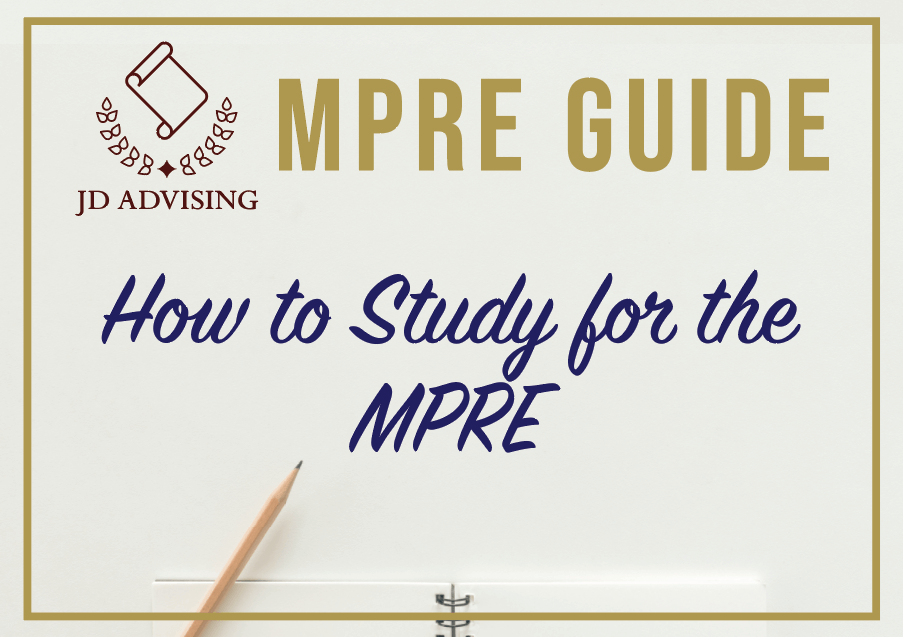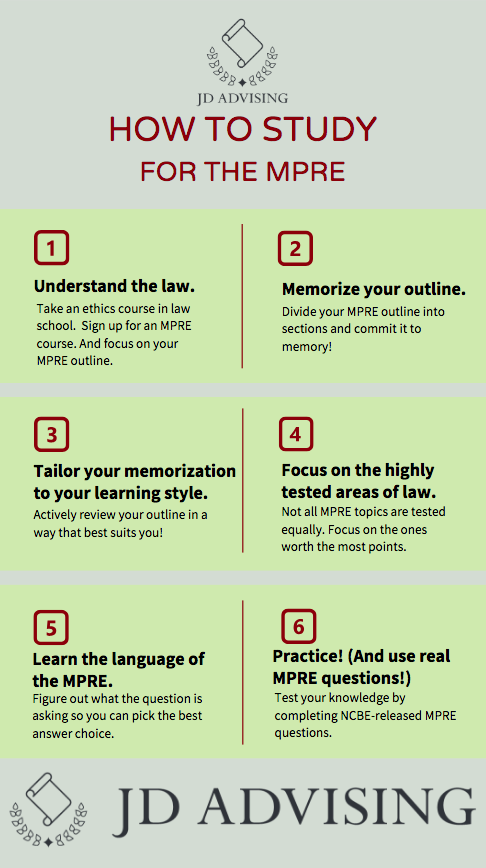Topic 6: How to Study for the MPRE
 Topic 6: How to Study for the MPRE
Topic 6: How to Study for the MPRE
Here, we talk about how to study for the MPRE. This gives you an overview of how to use your time and energy efficiently so you only have to take the MPRE one time. Hundreds of our MPRE students have used this approach and successfully passed the MPRE.
 How to study for the MPRE
How to study for the MPRE
1. MAKE SURE YOU UNDERSTAND THE LAW.
Some students dive right into practice questions without understanding the law. It is much easier to learn the law you need to know—and apply it correctly to practice problems—if you understand it! So, how do you learn the law? Here are a few ways:
- First, take a professional responsibility (sometimes called ethics) course prior to taking the MPRE. This will give you a good overview of the rules and cases on which the MPRE is based.
- Second, sign up for an MPRE course! Most bar review companies provide courses with lectures and outlines that explain the law. We do too! We have an MPRE course that is rated five stars by our students.
- Third, make sure to focus on your MPRE outline. Don’t look at it once and forget about it. You should be going through it again and again until you have a decent overall picture of the law as well as the ability to recite many of the key elements. Note: most MPRE courses, including ours, come with a free outline. (This also is Step 2, below!)
Focusing on the law first is one of the most essential MPRE strategies because you will be maximizing your effort and time!
2. DIVIDE YOUR MPRE OUTLINE INTO SECTIONS AND MEMORIZE ONE AT A TIME.
Learning the rules is very important for the MPRE.
We see a lot of students make the mistake of sitting through an MPRE lecture, then doing practice questions. They skip the vital step of actually learning the rules.
Do not just complete practice problems or you will find yourself progressing slowly! Instead, make quick progress by memorizing the rules before completing practice problems.
The best way to learn the MPRE rules is to divide your outline into sections. If your outline is 50 pages, for example, you could divide it into 10 sections of 5 pages (though we recommend dividing at natural stopping points rather than in the middle of a section). So, for example, conflicts could be one section, confidentiality could be another, judicial conduct could be a third, etc.
Then, memorize each one, section by section.
3. TAILOR YOUR MEMORIZATION TO YOUR LEARNING STYLE.
Use your learning style to your advantage. If you are a visual learner, use visual techniques to learn your MPRE outline (e.g., use charts, diagrams, colored highlighters, etc.). If you are an auditory learner, use auditory techniques (e.g., you may want to repeat your outline aloud, verbally quiz yourself, or have someone else quiz you). Tutoring or a study group also may be a good idea if you are an auditory learner. If you are a kinesthetic learner (i.e., you learn by moving or doing), you may want to pace or move around while reviewing, trace your outline, or act out certain parts of your outline!
Regardless of what you do, do not passively read your outline. Actively memorize it using a style that fits you.
4. FOCUS ON THE HIGHLY TESTED AREAS OF LAW.
Don’t waste time focusing on something that could only be worth a measly 2% of your overall MPRE score (e.g., don’t focus on judicial conduct, which is only going to take up 2-8% of the overall questions!). You shouldn’t ignore any portion of the MPRE substance, you just shouldn’t over-focus on it.
The rules you want to learn the most are the ones that are tested the most—e.g., conflicts, which will be 12–18% of the MPRE questions. Our MPRE frequency chart, in Topic 7 tells you what is most highly tested, and what isn’t. We also cover this in our MPRE course.
5. LEARN THE LANGUAGE OF THE MPRE.
The MPRE will ask questions in specific ways. You want to know exactly what the question is asking so that you can pick the proper answer choice. Check out the keywords and phrases on the MPRE in topic 8 here. You will learn to distinguish questions that ask, for example, if a lawyer is subject to discipline versus if a lawyer is subject to civil liability. We recommend you do this before you start practicing questions—you will get more questions right when you practice if you know precisely what the question is asking!
6. PRACTICE! (AND USE REAL MPRE QUESTIONS!)
After you are familiar with your outline, you need to put your knowledge into practice. The best source of MPRE questions is real MPRE questions that are promulgated by the National Conference of Bar Examiners (NCBE). You can find actual official MPRE questions here. These questions are closest to the real MPRE questions and are a great source of practice.
You also can practice with questions invented by a commercial course if you are looking for additional practice.
Once you start practicing, answer questions one-by-one before timing yourself. Every time you answer a question, review the answer explanation. If you answered the question incorrectly, ask why, for example:
- Was it because you did not know a rule?
- Did you misread the facts?
- Did you struggle with the call of the question?
If you did not know a rule, write it down. If you misread the facts, write down “misread the facts” on your separate pad of paper. If you struggled with the call of the question, write down a reminder of what a specific question really is asking. Then, constantly review this legal pad. You will find that your weaknesses become your strengths as, after writing down and reviewing what you struggle with, you truly will not repeat your mistakes!
Go to the next topic, Topic 7: MPRE Topic Frequency Chart.
Looking to Ace the MPRE?
- Enroll in our 5-star rated free MPRE Course, complete with expert guidance, an exclusive outline, practice questions, and a one-sheet.
- Tackle the Real MPRE questions — the gold standard for test preparation.
- Elevate your preparation with personalized MPRE private tutoring, featuring a tailored study plan and dedicated MPRE outline.
- Dive into our assortment of complimentary top-notch MPRE resources for your success.





Leave a Reply
Want to join the discussion?Feel free to contribute!